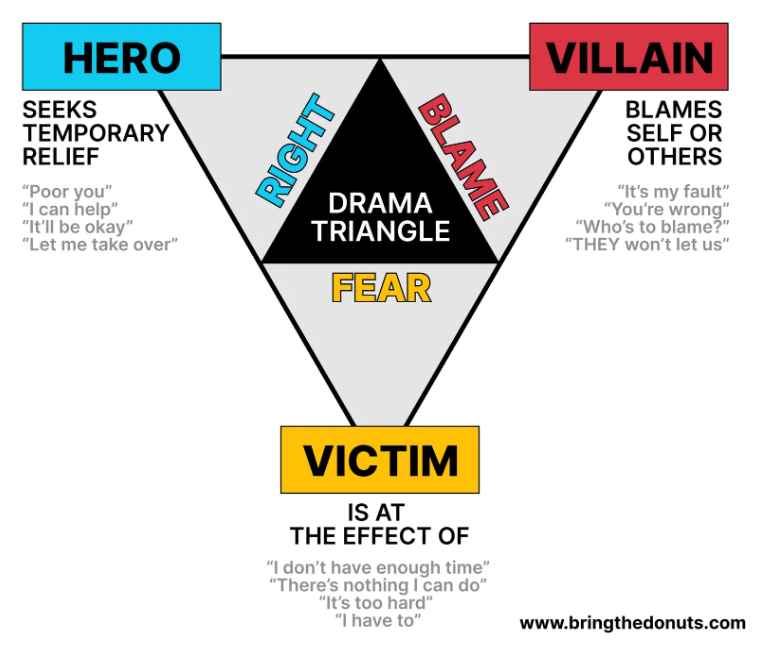What Role Do You Play In The Drama Triangle?
Are you causing drama in your relationships?
Victim, Perpetrator, or Scapegoat
Are you causing drama in your relationships?
I know it’s hard to admit, but even the healthiest, most regulated adults have moments of dysfunction when navigating highly stressful conflict.
In 1968, Dr. Stephen Karpman developed The Drama Triangle, a psychological model to help us understand the three predictable roles we tend to fall into during these conflicts: Prosecutor, Rescuer, and Victim. The idea is that we enter the Drama Triangle at a different starting position. We identify most strongly with this position during moments of conflict, but ultimately, we all end up as victims.
In this article, you will learn:
- What role you tend to play in the conflict
- How the Drama Triangle plays out during conflict
- How to step out of your role and navigate conflict in a healthier way

The Three Roles in the Drama Triangle
I recommend reading through each of the roles and answering the corresponding questions. Then, reflect on which starting role you identify with most. This will help you determine how to step out of your role and navigate the conflict in a healthier way.
Remember: None of these roles are worse than the others. They all have their pros and cons. It’s not helpful to shame yourself or identify as the “bad persecutor” or the “weak victim.” You may also take on different starting positions with different people. These roles are another tool to help you recognize how you cycle through these roles with specific people in your life and how you might be hindering your ability to resolve conflict.
1. The Victim
Feelings of powerlessness, helplessness, and self-pity characterize the Victim role. Individuals in this role often believe they are at the mercy of their circumstances or other people and feel incapable of changing their situation. This mindset keeps them trapped in a state of dependency and passivity. The Victim's internal dialogue might include thoughts like, "Why does this always happen to me?" or "There's nothing I can do."
Are You A Starting Role Victim?
- Do you have trouble taking responsibility for your actions, thoughts, and feelings during conflict?
- Do you feel your best when others are taking care of you?
- Do you wish you could solely depend on others?
- Do you have trouble seeing what is going well in your life?
- Do you constantly try to assert why you are the one in the most pain or struggling during conflict?
- Do you become highly emotional during conflict to the point where the other person has to take care of you and cannot share their perspective?
- Do you have trouble taking care of yourself?
- Do you feel like a small child or defenseless during moments of conflict?
2. The Persecutor
The Persecutor is the antagonist of the Drama Triangle, often exerting control through criticism, blame, and anger. This person takes an authoritarian stance and sees themselves as superior while others are inferior or incompetent. Persecutors are often in denial about their behavior and quickly become defensive. When someone calls them out, they tend to argue about why they did something hurtful and how it was necessary. Many persecutors were abused as children or experienced childhood trauma. They may hide their pain by becoming detached, often asserting that the world is out to get them. The Persecutor's behavior is driven by a need to dominate or punish, and they often lack empathy for the Victim. Their internal narrative might sound like, "This is all your fault!" or "You're not doing it right!"
Are You A Starting Role Persecutor?
- Do you have a deep need to be right?
- Do you always want to dominate the argument or be in control during conflict?
- Do you tend to blame others and feel a sense of internal righteousness in conflict?
- Do you often feel that others are not as smart as you or they’re incompetent?
- Are you prone to criticism, anger, or blame during conflict?
3. The Rescuer
Rescuers identify as helpers and need someone to rescue to feel important. Many struggle to see themselves as victims because they believe they have all the answers. Their biggest fear is that they will end up alone or won’t be useful. The Rescuer takes on the role of the savior, intervening to help the Victim, often without being asked. While this may seem altruistic, the Rescuer's actions are typically motivated by their own need to feel needed or superior. The Rescuer's involvement reinforces the Victim's dependence and perpetuates the cycle. The Rescuer might think, "I’m the only one who can help," or "They can't do it without me."
Are You A Starting Role Rescuer?
- Do you offer help even when you haven’t been asked?
- Do you base your entire identity around helping others and being of service?
- Do you need to be helpful or useful to be accepted?
- Are you helpful at the expense of your own needs and wants?
- Are you fearful that you will be rejected if you’re not needed?
- Do you feel important or superior when you’re able to rescue others?
How the Drama Triangle Plays Out
The roles in the Drama Triangle are fluid, meaning individuals can shift from one role to another during interactions. For example, a person who starts as a Rescuer might become frustrated when their help is not appreciated and then shift into the Prosecutor role, blaming the Victim for their problems. Conversely, a Victim may become a Prosecutor by lashing out in anger or frustration, or a Rescuer may feel victimized when their efforts go unnoticed.
These shifts often create a toxic cycle of blame, resentment, and dependency, where no one truly takes responsibility for their actions, and the underlying issues remain unresolved. The Drama Triangle can perpetuate dysfunctional dynamics in personal relationships, workplaces, and broader social or political contexts.

Breaking Free from the Drama Triangle
To escape the Drama Triangle, you need to recognize your roles and consciously shift towards healthier, more constructive behaviors. For some people, this might mean taking responsibility for their behavior. For others, it’s about refraining from stepping in and helping everyone you meet. Some people have to learn how to become empowered to take control of their lives.
All of the roles can benefit from working on these skills:
- Awareness: The first step is becoming aware of the roles and patterns of interaction. Recognizing when you are slipping into the Victim, Persecutor, or Rescuer role is crucial for breaking the cycle.
- Personal Responsibility: It is key to take responsibility for your own emotions, actions, and decisions. Instead of blaming others (Prosecutor), seeking control (Rescuer), or feeling helpless (Victim), focus on what you can do to change the situation or your response to it.
- Empathy and Communication: Developing empathy for others and improving communication can help reduce the need for manipulation or control. Rather than trying to fix someone else's problems (Rescuer) or blame them (Persecutor), practice active listening and offer support without taking over.
- Empowerment: Moving away from the Victim role involves recognizing your power and agency. This might mean setting boundaries, asking for what you need, or taking steps to improve your situation.
Each role also needs to work on a specific skill set.
Victims often have the skills to solve their problems but lack confidence. If your starting position is Victim, you will want to work on becoming a Creator.
- Creators take responsibility for their own life and their choices.
- Creators are active problem solvers.
- Creators can take care of themselves.
- Creators ask, “What do I want from life, and how can I get there?”
- Creators take note of what is going right in their life.
Rescuers have an innate desire to help others and are often very empathic and understanding. If your starting position is Rescuer, you will want to work on becoming a Coach.
- Coaches are helpful and supportive like teachers, not martyrs.
- Coaches help without expectations.
- Coaches give people the tools to solve their problems instead of making them rely on them.
- Coaches help with boundaries and stick to them.
- Coaches trust that others can solve their problems.
Persecutors often conceal a deep desire for love and acceptance. If your starting position is Prosecutor, you will want to work on becoming a Challenger.
- Challengers avoid using excessive blame, criticism, or domination.
- Challengers are firm and fair.
- Challengers confidently ask for what they need without punishment.
- Challengers address real consequences and set boundaries.
Stephen Karpman's Drama Triangle is a powerful tool for understanding conflict dynamics and manipulation in human relationships. By identifying and breaking free from the roles of Victim, Persecutor, and Rescuer, you can foster healthier interactions and create more balanced and fulfilling relationships. The key lies in awareness, personal responsibility, and a commitment to change.